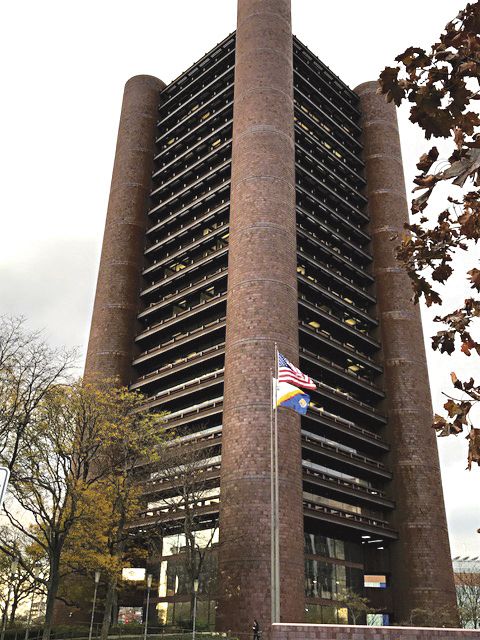Processing Your Payment
Please do not leave this page until complete. This can take a few moments.
- News
-
Editions
View Digital Editions
Biweekly Issues
- May 13, 2024
- April 29, 2024
- April 15, 2024
- April 1, 2024
- March 18, 2024
- March 4, 2024
- February 19, 2024
- February 5, 2024
- January 22, 2024
- + More
Special Editions
- Lists
- Viewpoints
- HBJ Events
- Business Calendar
- Custom Content
Knights of Columbus' insurance business enmeshed in bitter contract dispute
 Photo | Chris Hoffman
The Knights of Columbus headquarters at 1 Columbus Plaza, New Haven.
Photo | Chris Hoffman
The Knights of Columbus headquarters at 1 Columbus Plaza, New Haven.
The Knights of Columbus are perhaps best known for their colorful plumed hats and the charity work done by their thousands of local councils.
But there is another side to the world's largest Catholic fraternal organization that gets far less attention. The group also operates a tax-exempt Fortune 1000 insurance company that in 2016 sold $8.5 billion worth of life insurance to its North American members.
That part of the Knights — run by its parent organization from the order's fortress-like headquarters in downtown New Haven — is at the center of a bitter civil lawsuit accusing it of membership fraud, racketeering, theft of trade secrets and breach of contract.
Knight leaders, court documents allege, are concealing a significant membership decline to protect their lucrative insurance business. They are doing so by preventing local councils from taking long-lapsed members off their rolls and maintaining “phantom” councils composed entirely of dead and lapsed Knights, the suit alleges.
The lawsuit was originally brought in Jan. 2017 in U.S. District Court in Colorado by Boulder-based UKnight Interactive, a spurned IT vendor that says it had an agreement to become the preferred website provider for the Knights' 15,000-plus local councils.
UKnight, which is using outside investment to fund its lawsuit, said it was fired in violation of an oral contract after top Knight executives realized that its system would expose fraudulent membership numbers, court records say. The order then used trade secrets pilfered from UKnight to try to recreate UKnight's system in-house, the suit alleges.
The Knights and their lawyers deny the order ever had a contract with UKnight and all the other allegations, calling them “scandalous” and “utterly false.”
“Strip away all the absurd claims, and this case boils down to a garden-variety business dispute by a website vendor that failed to close a business deal,” the Knights wrote in a recent court filing.
For months starting last fall, the case was on hold as the two sides tried to mediate a resolution. That effort failed in early January, and the legal warfare has resumed.
Serial entrepreneur with mixed track record
In 2009, Colorado businessman Leonard Labriola and some partners began offering website services — through UKnight Interactive — to local Knights of Columbus councils, according to the lawsuit. He and one of the partners are members of the order, and their product quickly proved popular with their fellow Knights, court papers say.
It was the latest in a long line of ventures for Labriola, best described as a serial entrepreneur with a mixed track record. In 1999, his high-profile attempt to revive the fabled Indian Motorcycle brand collapsed into a years-long legal battle over who owned the trademark — a fight he ultimately lost. He later made youth football instructional videos featuring Bill Parcells and other NFL notables, and created a company to produce a hydrogen engine that failed in less than a year, according to publicly available information.
In 2009, at about the same time he became involved with UKnight, Labriola declared personal bankruptcy, federal court records show. He emerged from bankruptcy a year later.
UKnight's lawyer, Jeffrey Vail, defended Labriola's track record, saying that like many serial entrepreneurs, he has had both successes and failures. He added that Labriola also founded and ran a successful VCR cassette brokerage in the 1980s and early 1990s.
In a court document filed last summer, the Knights disparaged Labriola's business career. Asked if the Knights knew of his business history when their business contacts began, Knights Senior Vice President and Chief Communications Officer Kevin Shinkle declined comment.
Promises allegedly made, broken
In 2011, Labriola and his partners thought they'd hit the jackpot. In response to an inquiry from UKnight, the Knights' national organization invited Labriola and his partners to New Haven where they verbally agreed to designate UKnight as its preferred website provider for local councils, according to the lawsuit.
Under the deal, the Knights would pay the company nothing, according to the suit. UKnight would make its money from fees charged to the local councils, the lawsuit says. That made the parent organization's endorsement critical, the suit says.
The Knights, however, never followed through or provided a written contract, the suit alleges. For more than four years, the Knights strung the company along with promises that the public designation was imminent, only to postpone again and again, the suit says. The pattern continued even as the Knights deepened the relationship by having UKnight begin work on an in-house system as well, the suit alleges.
In the summer of 2015, the Knights sent a consultant to the company's Texas office as a ruse to obtain its trade secrets, the action alleges. The consultant showed UKnight executives an email instructing him to obtain information about their system so the Knights could hire another vendor to build it, according to court papers.
Six months later, the Knights abruptly informed UKnight that the organization never had any agreement with the company and it would search for another website provider, the suit says. Four months after that, UKnight saw its trade secrets in a Knights' request for proposal to build a website, the suit alleges.
UKnight's evidence in the case includes surreptitious recordings its executives made between 2011 and 2016 of telephone conversations with Knights officials, court filings show. As part of a countersuit that also alleges UKnight infringed its copyrights, the Knights are challenging the use of the recordings in the case, calling them illegal under Connecticut law, a charge that UKnight denies.
In their court responses and statements to HBJ, the Knights acknowledge years of business contacts with UKnight but strongly deny any contract, written or otherwise, ever existed or that they stole the company's trade secrets. They severed the relationship because UKnight's product was substandard, court records say.
“The true nature of this action is that the plaintiff (UKnight) is a disappointed prospective vendor that offered the order inferior and outdated website services that the order refused to endorse,” the Knights said in a recent court filing. “UKnight is now trying to accomplish through this lawsuit what it could not get through product development and sales negotiations.”
Alleged membership fraud
UKnight, however, tells a different story. The Knights dumped the company after top executives realized UKnight's systems, if widely adopted, would expose to others within the order a long-standing attempt to conceal falling membership, the suit alleges. Specifically, Knights insurance agents would have had for the first time a full listing of who does and does not pay dues in their territories.
UKnight became aware of the fraud during and after its work for the Knights' national leadership, company attorney Vail said. Based on information provided by agents, UKnight estimates that the order's membership is at least 100,000 fewer than the 1.9 million it claims, court records show.
That could have serious consequences for the Knights' insurance business, giving them a strong incentive to conceal it, the suit alleges. Because the Knights are a tax-exempt mutual benefit society, they can only sell insurance to their American and Canadian members. That means their North American membership is their risk pool, and a shrinking risk pool can be bad news for an insurer, potentially leading to rating-agency downgrades and other possible financial issues, the suit says. (UKnight also claims the Knights have a rapidly aging membership, which also poses a risk to a life insurance company.)
By hiding its true membership, the suit alleges, the Knights are misrepresenting the company's fiscal health.
Methods the Knights use, according to the suit, to prevent local councils from removing members include: an overly drawn-out, complicated and confusing removal process; caps on how many members a council can drop in one year; and requiring a new member to join before a departed member is dropped.
In its court filings, UKnight, which still provides website services to hundreds of local Knights councils, says “numerous” councils have told it they are forced to carry lapsed members on their rolls (and pay their fees to the state and national organizations) and cites examples: a New Jersey council listing 316 members, but having only 54; a Texas council denied a request to remove 200 inactive members — half its listed membership; and another Texas council that attempted to purge 80 long-lapsed members, but was allowed to remove only eight.
Another method for concealing declining membership is the maintenance of “phantom” councils composed entirely of dead or long-departed members, a practice “numerous” former Knight insurance agents have told UKnight about, the suit alleges.
One former agent told UKnight he stumbled across one such council listed in Georgetown, Ill., according to court papers. When he called members to drum up business, he discovered all were either dead or lived elsewhere and had not been involved with the Knights for years, the suit says.
The agent reported his findings to Knights Chief Insurance Officer Thomas P. Smith Jr. and others, but he was ignored, court papers allege. Later, Smith and the agent's supervisor manufactured false allegations to fire him, according to court papers.
The Knights denied allegations of “phantom” councils in court filings and, when asked by HBJ, didn't comment on the allegations against Smith.
Falling membership claims 'not logical'
Shinkle declined to directly address UKnight's specific allegations, but strongly denied that membership fraud is occurring. He cited the Knights' record-breaking growth in recent years of insurance in force — it went from $40 billion to $105 billion between 2001 and 2016 — charitable donations and hours devoted to charity as proof membership could not be declining.
“It's inconceivable to me that if the numbers were off to the extent that the plaintiffs argue … that we could be setting those types of records,” Shinkle said. “It's just not logical, and it's implausible, if not downright impossible, and yet we are (setting records) year after year after year.”
Shinkle added that local councils must follow “a strict retention protocol that requires a thorough examination of whether a member truly intends to leave the order.” That includes safeguards to assure members who missed a renewal letter or failed to pay their dues as a result of personal or economic hardship or illness are not precipitously dropped from the rolls, he said.
“If there are specific allegations that those (retention protocols) were not followed, we will be looking into those,” he added.
Asked if the Knights have looked into the allegations made in the year-old lawsuit, Shinkle declined comment. He also declined to provide HBJ with the retention protocol.
Common knowledge
In late September and October, not long before the two sides agreed to mediation that later failed, UKnight submitted court documents containing new information backing its membership-fraud claims. They alleged about two dozen councils had recently told UKnight that 43 percent of their members are lapsed, but they are not allowed to remove them.
One of the documents includes emails from Knights in Minnesota and Texas backing up allegations of a campaign to inflate membership.
In interviews with HBJ, two Knights whose emails are cited in the court papers confirmed that their councils are compelled to carry and pay dues for large numbers of long-lapsed members. They do not fall into the categories of hardship cases or older members who no longer have to pay dues, they said. Ten to 20 percent of their councils' memberships are lapsed, they said.
“Any time you get a bunch of treasurers and financial secretaries together, it's common knowledge that you've got (lapsed) members you can't get rid of,” said George Lawshe, former treasurer and current deputy grand knight of Council 11414 in Dallas, Texas. “Most say 'to hell with it' because it's so difficult to get them off the rolls.”
Georges Montillet, grand knight of Council 13027 in Rochester, Minn., called the removal process “byzantine” and said it appears designed to thwart removals.
“It takes six months to a year to remove a lapsed member — if you do all the paperwork just right,” Montillet said. “It's such a burdensome and complicated paperwork process that it's almost impossible to do it right. I'm quite sure that's intentional.”
The pair said their dealings on membership issues were with the Knights' state organizations, not the national order. Montillet added that the Minnesota state organization made it clear it was following rules set down by the group's New Haven-based headquarters.
Knight spokesman Shinkle declined to specifically comment on the two local Knights' statements or say if the Knights would investigate their complaints.
A defense
Not all Knights, however, see a problem.
Charles Crawford of Marietta, Ga., the Knights' Georgia membership retention chairman, said in an interview he knew of no council in his state compelled to carry lapsed members and no membership decline.
Councils sometimes build up backlogs of lapsed members, but most remain thanks to the Knights' multi-step retention process, Crawford said. Often it emerges that lapsed members are sick, have moved or have money problems, in which case the Knights grant them forbearance on dues, he said. Priests and life members also don't pay dues, he said.
Crawford said members can leave the order with a resignation letter, adding he has never seen one rejected.
In their latest legal filing in late January, the Knights sought to remove the membership fraud allegations from the case by arguing they are irrelevant. They also argued that the freedom of religion and other provisions of the First Amendment prohibit the courts and UKnight from delving into their membership practices.
UKnight has also upped the ante since litigation resumed in early January, filing a court challenge to the order's tax-exempt status. Among the reasons is what it calls excessive compensation for top Knight executives, given the organization's status as a charity.
According to federal tax filings, Supreme Knight Carl Anderson, the organization's head, earned more than $2.2 million in 2014 and more than $1.2 million in 2015. Shinkle said Anderson's salary is reasonable, given the Knights are a Fortune 1000 entity and a ministry.
Supreme is using members as unpaid employees for the insurance company. If they paid the members for prospecting new members they would go broke. Supreme only cares about the "volunteer hours" so they do not have to pay income taxes.
Knights have changed, after Carl Anderson became the Supreme Knight, we were a fraternal organization with an insurance benefit, we have become an insurance company pretending to be a fraternal charity. We are now making a few at the top multi-millionaires.

2022 Giving Guide
This special edition informs and connects businesses with nonprofit organizations that are aligned with what they care about. Each nonprofit profile provides a crisp snapshot of the organization’s mission, goals, area of service, giving and volunteer opportunities and board leadership.
Learn more
Subscribe
Hartford Business Journal provides the top coverage of news, trends, data, politics and personalities of the area’s business community. Get the news and information you need from the award-winning writers at HBJ. Don’t miss out - subscribe today.
Subscribe
2024 Book of Lists
Delivering Vital Marketplace Content and Context to Senior Decision Makers Throughout Greater Hartford and the State ... All Year Long!
Read Here-
2022 Giving Guide
This special edition informs and connects businesses with nonprofit organizations that are aligned with what they care about. Each nonprofit profile provides a crisp snapshot of the organization’s mission, goals, area of service, giving and volunteer opportunities and board leadership.
-
Subscribe
Hartford Business Journal provides the top coverage of news, trends, data, politics and personalities of the area’s business community. Get the news and information you need from the award-winning writers at HBJ. Don’t miss out - subscribe today.
-
2024 Book of Lists
Delivering Vital Marketplace Content and Context to Senior Decision Makers Throughout Greater Hartford and the State ... All Year Long!
ABOUT
ADVERTISE
NEW ENGLAND BUSINESS MEDIA SITES
No articles left
Get access now
In order to use this feature, we need some information from you. You can also login or register for a free account.
By clicking submit you are agreeing to our cookie usage and Privacy Policy
Already have an account? Login
Already have an account? Login
Want to create an account? Register
Get access now
In order to use this feature, we need some information from you. You can also login or register for a free account.
By clicking submit you are agreeing to our cookie usage and Privacy Policy
Already have an account? Login
Already have an account? Login
Want to create an account? Register





2 Comments